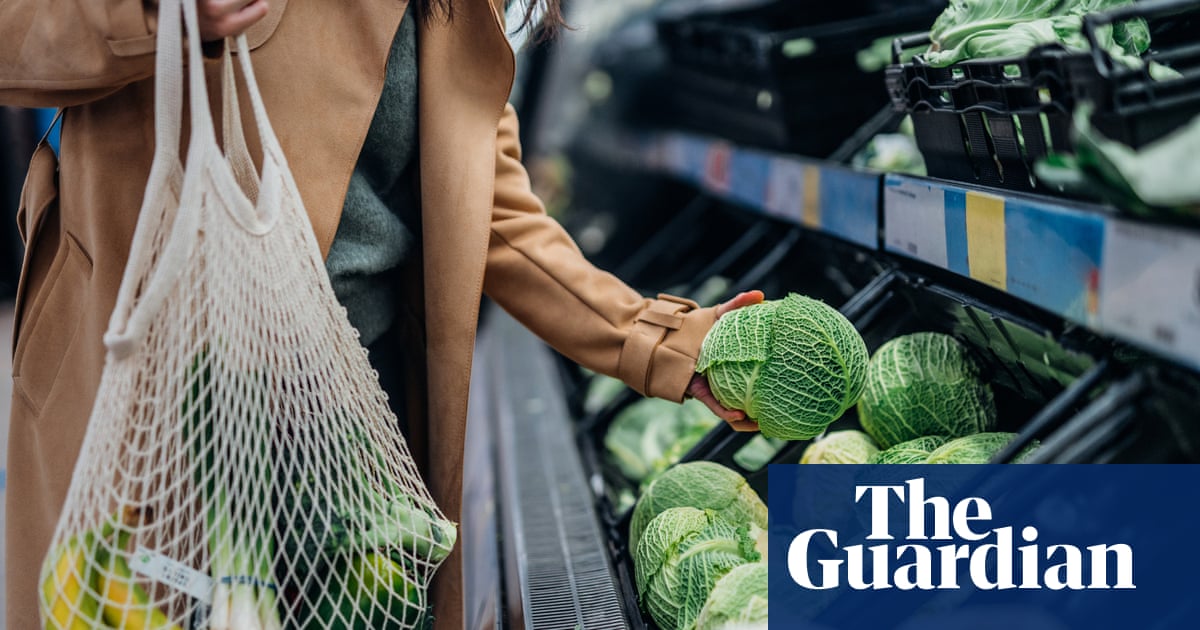In 2004, Donald Davis and fellow scientists at the University of Texas made an alarming discovery: 43 foods, mostly vegetables, showed a marked decrease in nutrients between the mid and late 20th century.
According to that research, the calcium in green beans dropped from 65 to 37mg. Vitamin A levels plummeted by almost half in asparagus. Broccoli stalks had less iron.
Nutrient loss has continued since that study. More recent research has documented the declining nutrient value in some staple crops due to rising atmospheric carbon dioxide (CO2) levels; a 2018 study that tested rice found that higher CO2 levels reduced its protein, iron and zinc content.
While the climate crisis has only accelerated concerns about crops’ nutritional value, prompting the emergence of a process called biofortification as a strategy to replenish lost nutrients or those that foods never had in the first place.
I realize thye said it’s due to CO2, but I can’t help but think it also has to do with selectively breeding crops for mass production- and stupid things like being shiny red (as in certain apples) or other qualities that might make them more marketable instead of nutritious.
Interesting idea.
I submit another idea: that food grown is being harvested earlier for quick turnaround and, for example the fruiting parts, immature in comparison from years ago.
If the plant ramps up nutrient storage as seeds mature, early harvesting is counterproductive.
I’d love to test that idea!
I suspect one would find both contribute, and also possibly soil depletion.
All I really know is that heirlooms taste better and are far more satisfying. But even just burpee seed tomatoes, letting them ripen on a still-live vine is insanely more flavorful than picking them green and letting them ripen in transit.
Or like with apples- they’re harvested in the fall, and stored just above freezing.
Ultimately the cause is commercialization, if there’s More ways it happens.
I don’t know about tomatoes, but with stawberries, that’s just water. You sell strawberries by mass, so in the store, we have very large ones with a lot of water.
I’ve had wild strawberries a few times. They have a much stronger flavor, but they’re also tiny compared to commercial ones.
Growing the same basic varieties, it’s definitely within the same mass range you’d expect. Keep in mind it’s not just absorbing water, when it ripens on a still-in-the-ground vine, it’s also absorbing nutrients etc.
Commercially grown tomatoes are cut off from that and left to ripper on their own. The flavor is almost entirely different. Keep in mind that commercial varieties aren’t any where close to ready when they’re picked. (This includes the “vine on” things they like to sell now too.)
A tomato is “good enough” when it’s yellow, picking them can keep the plant producing well into fall.
I’ve had plants that have gone the better part of seasons before it got… unwieldy in the aero racks, but I’m forcing year round in a greenhouse.
they’ll still be amazing, but not quite as amazing if you let it come off after a gentle twist. Also, if you’re normal and growing outside, rain can cause splitting, so it’s best to pull it in early if that’s expected.
Just some learned advice… resist the temptation do blackberries or raspberries inside a greenhouse…. Yeah. That’s a war….
deleted by creator
Yup. The short and simplified reason is that consumers ask for price and appearance rather than flavor and nutrition.
The tomatoes you buy in stores during winter (when tomatoes normally don’t grow) are often speed-grown in greenhouses heated by fossil fuel.
If you ever grow your own tomatoes you’ll understand what a tomato “should” taste like.
I’ve actually taken seeds from the tomatoes in stores and grown them myself. The flavor of a store bought tomato pales in comparison to a freshly picked tomato.
And I don’t even like tomatoes.
The flavor of a freshly picked tomato pales in comparison to a store bought tomato
I think you got that backwards, unless you’re over there eating store tomatoes in paroxysms of ecstasy?
Ope. I do have that backwards. Thanks!
My mom grew tomatoes every year until she couldn’t physically garden anymore.
They were still disgusting.
Ok. I grow tomatoes every season and they are fucking delicious on a whole different level.
I suppose this proves the point that home-grown Vs commercial-grown isn’t the only piece of the puzzle.
Right? We mono-crop loam into dust without any regenerative farming cycles to replenish the top soil.
breeding crops for mass production- and stupid things like being shiny red (as in certain apples) or other qualities that might make them more marketable instead of nutritious.
You’re definitely not wrong in that at all.
But… they actually cover the apples in bug secretions to make them so shiny.
Still, uh, organic….
Small farmer here. Devoid the soil of nutrients by tilling. Kill all the soil biology by spraying chemicals. Grow only fast yield cash crops. Grow the same crop year after year for decades or more. Breed crops for appearance and yield over nutrition. What the fuck do you expect?
I’m not a farmer but I’ve been reading about the history of industrial farming lately and I’ve become convinced that we’re approaching agriculture completely wrong. We’re planting massive monocultures in soil that’s been wrecked for decades (via the things you’ve mentioned), surely that would have something to do with it?
If we completely flipped everything we’ve been doing for agriculture we’d be better off in the long run. Small farms have better yeilds, polycropping is better for the environment and modern pesticides create an evolutionary arms race that we will never win. We’ve got it all wrong and we’ve known it since (at least) the 70s. These outdated, expensive, impractical agricultural practices are only making things worse
Longer than the 70s, the fucking Dust Bowl was all about this. We’ve known better for almost an entire century and we’re STILL fucking the soil with mono-crops
As you say, you’re not a farmer.
Monocropping is vastly more efficient on a number of counts, especially labour input. I can’t emphasise enough what a big deal that is, it’s really the only reason anyone is getting fed.
Yes, there’s a lot of problems with agriculture - predominantly its scale and extent, but eight billion mouths take a lot of feeding. Topsoil loss should be our main concern, together with biogeochemical flows/losses. Every other issue is fairly minor in comparison, really.
If North America could solve it’s food waste problem we would not need so much industrial monocropping that actually feeds no one.
Again, that’s not really how food production works - although it is a problem. Production surpluses are an essential buffer to deal with both supply and demand shocks, the elasticity this provides is (and I’m repeating myself) the only reason anyone is getting fed.
Capturing that food waste so it can at least end up back in the soil, yes, that’s something that needs improving.
deleted by creator
Sure: bring down CO2 levels. So probably not for a while.
Also, we breed for size and taste. That will also lead to lower nutrient density.
But we don’t breed for taste, only for looks. Ask anyone who’s been to Europe how much better their fresh food tastes compared to what’s on North American store shelves.
Let’s not pretend that Europe is a utopia. We’re going through the same shit as North America, with fruit/veg that lacks taste, looks uniform, and goes off quickly.
Yep and it varies a lot by country, for example in the Netherlands I can pretty much only find tasteless water shaped like perfect round tomatoes, but in France I can still find all sorts of different varieties with amazing taste , ans natural looks (like coeur de boeuf).
Yeah most of the good veg here in England is from small organic growers, and that’s too expensive for a lot of people. I grow my own tomatoes and they’re yummy, the supermarket ones taste bland as fuck.
Oh my god, yes.
Prices are (were?) Lower over there too. I literally ate like 4 or 5kg of apricots in less than a week over there.
If your comparison is to the US, one thing to note is that up until very recently, the EU provided more agricultural subsidies and had higher import tariffs.
I guess by taste, I simply meant sugar content. Our fruits tend upp the size and sugar. Our vegetables tend to just up the size and in turn become bland and often watery.
I learned about how we made apple’s shitty by breeding for appearance and got very bummed out.
First the taste got lost, now they turn into the nutritious equivalent of card board. The nutrition supplements industry: “Hell, yeah!” But you have to give it to them, every vegetable and every fruit looks perfect now and keeps that look for a long time. What can be better than that?
My neighbor has a balcony and has tomato plants on it every year, and they are the ugliest tomatoes I have ever seen and have the best taste of any I have ever eaten. I want a balcony or a garden so badly.
There are many things that are unsupported in this article
First off, the laboratory methodology changed for testing food. Modern testing techniques much more accurate than the ones in the 50’s and 70’s. They did not run the older methodologies on modern food. So basically the entire premise is comparing apples to oranges. We don’t know if the changes are due to reality or procedure changes.
The second study on rice had me smiling. From somebody who knows nothing about breeding cereal grain it would seem to be a slam dunk, however reality is more complicated. All cereal breeders struggle with the tradeoff between maximizing yield and lodging resistance. Lodging is when the stalk falls over. When it falls over major yield losses can occur (50%+ depending on the stage). It also causes major difficulties with harvesting on equipment and time. Extra CO2 increases plant size and kernal size. A taller plant with a heavier seed head that a slight breeze will knock over. Breeders will select genetically smaller kernals and smaler stature plants to compensate for increasing CO2. This is the major reason that all hybrid wheat attempts have failed. It makes a huge plant that falls over.
Some basics on nutritional density of vegetables.
Fruit size: in general the larger the fruit lower the nutritional density. The plant only has so much it can create or pull from the soil.
Nutrient density is affected by position on the plant where it is grown. Earlier set fruit tend to have higher nutritional density than later set fruit. You can look up more on this on source/sink studies.
Nutrient availability: plants that are slightly nutritionally deficient will produce smaller fruits/seeds. The smaller size will make the fruit more nutrient dense.
The weather is the single largest determining factor. When a plant is happy with ideal conditions the nutrient density is lower. When the plant is stressed and grows more slowly, it produces less yield with higher density food.
Genetics: Sometimes plant breeders select for higher nutritional density like watermelons. Sometimes they select for lower density like strawberries. It all depends on the market requirements.
Thanks for sharing these details.
Noob question: if I eat a huge apple or a small apple, but eat them full, wouldn’t I effectively get same amount of nutrients?
You would get similar amounts of total nutrients however, you’d eat more carbohydrates. The larger apple has less nutrient density.
Every discussion on food production is like this. Nowhere on the internet have I seen more people confidently spouting absolute nonsense as if it were expert testimony.
To be fair:
I have seen lot of nonsense spouted by the “experts.” PhD levels who are making bad assumptions outside of their field of expertise. I would say only about 1 in 10 papers I read is worth the time to download it.
It’s an ongoing issue with the high level of specialization in the sciences, especially in academia. Any topic which covers multiple disciplines turns into a clusterfuck.
Yes, it’s shocking what gets published nowadays.
It all depends on the market requirements.
But that’s the problem. Capitalism should never have been allowed to effect what a tomato or apple looked like vs the nutritional value it had. And in some (many?) cases that’s what happened.
Market requirements are not necessarily driven by capitalism.
Throughout history, needs of the culture determine the plant breeding efforts. Often flavor and nutrition have been traded for yield and storage.
For example the absolute worst watermelon I ever ate was in Uzbekistan. The soviet’s created a long-storage melon that lasts up to 10 months. It’s was about as bad as eating cardboard.
At a fundamental level the “need” for a long-storage watermelon developes out of capitalism, not a populace’s needs.
No, that’s not correct. The need is for food.
I met a Christian capitalist that runs a major tomato farm in Washington and that guy cares about nothing but money. I have met a lot of people who run companies who are like that.
We are in a lot of trouble if we don’t control companies with our wallets and get our government to do their jobs.
eats a multivitamin pill and some green beans
Can the decline be reversed?
Yes, through genetic engineering. But people are afraid of that solution.
But that would reduce yields and profit!
There’s that, but the bigger problem is all the scaremongering. People think GMO crops will kill them. Golden Rice could eradicate malnutrition for millions of people and it keeps getting rejected due to GMO fears.
Unfortunately not just that, but also similar to some potatoes, it’s capitalism killing it. golden Rice and their seeds are private and must be bought by a monopoly company only.
And this problem is really about GMO being considered as one thing. There is plenty of GMO that can be done that I don’t want but plenty I do. I want food to require QR codes that goes into detail on what the food is. Where it was grown, where it was processed, if its genetically modified have it spell out exactly what was done, etc.
The QR code thing is not a bad idea, but I think there should also be a central database, hopefully government-managed, where you can look it up before you get to the QR code or even the store.
yeah and it would actually not be that much more over the code. more than likely you would add the data and then make the QR code off of it.
Seeing “GMO free” on a container of any corn product always gets a giggle out of me
I don’t think so: GM is another tool in the set of developing plants, with its own risks and rewards. The same selection pressure applies to create something that will feed many people and make lots of money, and the same soil and air with certain amounts of nutrients ready to be processed by the plant.
A powerful tool, and perhaps you can reap lots of benefit from it, including more-burritos;* but maybe, like chemical fertilizers, it will turn out to be a mixed blessing, especially if mainly used under quantity-and-profit pressure.
* okay that was going to be “more-nutritious food”, but auto-correct had better ideas.
I started getting random muscle spasms and headaches. Finding out my magnesium levels were low. I saw in decade over decade it has drastically reduced in our food. Being how important it is to daily function it is scary what natural levels have dropped to.
Enshitification_IRL
It’s odd to me that we keep doing the same broken shit year in and year put. Shouldn’t we be running many different experiments across the nation to find a better way to live our lives?
I guess that was meant to be the states, each running things their way. Or the freedom of association to self select a commune that best reflects our values?
So why are we only trying different flavors of capitalism? Power. Inertia is a hell of a drug. The status quo persists, despite both mainstream political parties running on change (MAGA is basically rebranded change, just change to a worse time)
Are yall really arrogant enough to believe that we have developed the perfect economic system? The perfect government? That advanced aliens with light speed technology come and visit our world to study our highly developed way of life?
I don’t, I think perhaps we haven’t developed this better way yet. I don’t know what it is, but it’s definitely not what we are doing right now. Let’s try new things out.
Step 1 is getting our hands on the wheel. This means electoral reform so third parties can exist without a spoiler effect. This would benefit people of all political beliefs. Perhaps there are a good portion of conservatives not happy with the Republican (MAGA) party, but First Past The Post voting handcuffs them to these shitters. Something Luke Ranked Chouce voting would allow them to vote for a more reasonable conservative party (rebranded democrats basically).
Switching away from first past the post voting allows people to vote for who represents them best while still counting their vote against those they dont want to win. Just search for videos on FPTP voting if you want an explanation on how and why the spoiler effect exists.
Electoral reform is possible in each individual state (for now), we dont need federal reform! Maine and Alaska have already passed electoral reform.
So what’s the hold up with the rest of the states? Consider starting a campaign to change how we vote in your own state! Force our representatives to compete with fresh outside ideas. We deserve the best representation, not excuses.
Ok how concerning should this be? Because nutritional science can be very counterintuitive. Is eating one green bean today worth like half as many as ten years ago or is it like eating 99% of one from ten years ago?
The article reads as advertisement for a seed nutrient fortification company, and a chemical nutrient fortification company.
There was no mention of what I see as a major problem, that is the access to local produce. Mass production and monopolization/centralization of produce and its distribution methods, means longer times from harvest to table, which is likely a major source of nutrient loss.
Here’s a journal article talking about it from 1977: Effect of Storage of Nutritive Value of Food
Considering abundance & multivitamins: I eat fruits & veggies for the fiber not nutrition.


















